Fleurs du Mal Magazine


Or see the index
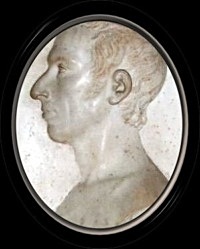
To Mary
If I had thought thou couldst have died,
I might not weep for thee;
But I forgot, when by thy side,
That thou couldst mortal be:
It never through my mind had past
The time would e’er be o’er,
And I on thee should look my last,
And thou shouldst smile no more!
And still upon that face I look,
And think ’twill smile again;
And still the thought I will not brook,
That I must look in vain.
But when I speak–thou dost not say
What thou ne’er left’st unsaid;
And now I feel, as well I may,
Sweet Mary, thou art dead!
If thou wouldst stay, e’en as thou art,
All cold and all serene–
I still might press thy silent heart,
And where thy smiles have been.
While e’en thy chill, bleak corse I have,
Thou seemest still mine own;
But there–I lay thee in thy grave,
And I am now alone!
I do not think, where’er thou art,
Thou hast forgotten me;
And I, perhaps, may soothe this heart
In thinking too of thee:
Yet there was round thee such a dawn
Of light ne’er seen before,
As fancy never could have drawn,
And never can restore!
Charles Wolfe
(1791-1823)
To Mary
fleursdumal.nl magazine
More in: Archive W-X, Archive W-X, CLASSIC POETRY

Mediocrity in Love Rejected
Give me more love, or more disdain;
The torrid or the frozen zone
Bring equal ease unto my pain;
The temperate affords me none;
Either extreme, of love or hate,
Is sweeter than a calm estate.
Give me a storm; if it be love,
Like Danae in that golden shower,
I swim in pleasure; if it prove
Disdain, that torrent will devour
My vulture hopes; and he’s possessed
Of heaven that’s but from hell released.
Then crown my joys, or cure my pain;
Give me more love, or more disdain.
Thomas Carew
(1594? – 1640)
Mediocrity in Love Rejected
fleursdumal.nl magazine
More in: Archive C-D, Archive C-D, CLASSIC POETRY
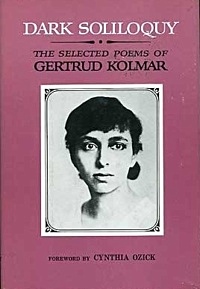
Komm
O komm.
Du amethystenes Gewölbe großer Nacht.
O komm.
Du goldgestickte Decke über süßen Broten.
O komm.
Sternsamen, aus dem himmlischen Getreide rieselnd sacht.
O komm.
Du kupferdunkle Schlange, die mit Lebensgeifer spritzt die Toten.
O komm.
Du überm Alltag schwebende, verzückte Melodie,
O komm.
Ich möchte einmal dich mit Lippen fassen, eh ich sterbe.
O komm.
Du meine braune Rose. Solche gab es nie.
O komm.
Du samtner Taumund voll unsäglich süßer Herbe.
O komm.
Grau riesenhafter Turm, der in die Öden floh.
O komm.
Ich duck mit Schleierkäuzen mich am Fenster ohne Scheibe.
O komm.
Du steinernes Gesetz, das bröckelnd stürzte irgendwo.
O komm.
Ich richte die geborstne Tafel auf an finstrer Eibe.
O komm.
Du Zauberspange, die der unverstandne Spruch durchflicht.
O komm.
Mein Haupt in Ruhe, meine Stirn in Schlaf zu schließen.
O komm.
Du blauer Brunnen, der aus jeder Blume eine schöne Iris bricht.
O komm.
Du Regenbogenweinen, grasgesäumtes Fließen.
O komm.
Mein Kind. O komm, o komm, du Kind.
O komm.
Mein hohler Paukenschlag kann mich nicht mehr betäuben.
O komm.
Und willst du nicht, so nimm mich in den Wind.
O komm.
Und laß mich überm Meere, Ockersand, verstäuben.
Gertrud Kolmar
(1894-1943)
gedicht: Komm
fleursdumal.nl magazine
More in: Archive K-L, Archive K-L, Kolmar, Gertrud
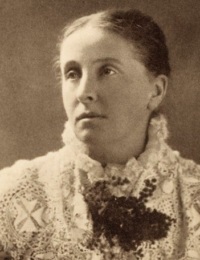
Faith
And is the great cause lost beyond recall?
Have all the hopes of ages come to naught?
Is life no more with noble meaning fraught?
Is life but death, and love its funeral pall?
Maybe. And still on bended knees I fall,
Filled with a faith no preacher ever taught.
O God — MY God — by no false prophet wrought —
I believe still, in despite of it all!
Let go the myths and creeds of groping men.
This clay knows naught — the Potter understands.
I own that Power divine beyond my ken,
And still can leave me in His shaping hands.
But, O my God, that madest me to feel,
Forgive the anguish of the turning wheel!
Ada Cambridge (Cross)
(1844 – 1926)
Faith
fleursdumal.nl magazine
More in: Archive C-D, Archive C-D, CLASSIC POETRY

Helas
To drift with every passion till my soul
Is a stringed lute on which all winds can play,
Is it for this that I have given away
Mine ancient wisdom, and austere control?
Methinks my life is a twice-written scroll
Scrawled over on some boyish holiday
With idle songs for pipe and virelay,
Which do but mar the secret of the whole.
Surely there was a time I might have trod
The sunlit heights, and from life’s dissonance
Struck one clear chord to reach the ears of God.
Is that time dead? lo! with a little rod
I did but touch the honey of romance
And must I lose a soul’s inheritance?
Oscar Wilde
(1854 – 1900)
Helas
fleursdumal.nl magazine
More in: Archive W-X, Wilde, Oscar, Wilde, Oscar

Pierre-Jean de Béranger
La bacchante
Cher amant, je cède à tes désirs ;
De champagne enivre Julie.
Inventons, s’il se peut, des plaisirs
Des amours épuisons la folie.
Verse-moi ce joyeux poison ;
Mais surtout bois à ta maîtresse :
Je rougirais de mon ivresse
Si tu conservais ta raison.
Vois déjà briller dans mes regards
Tout le feu dont mon sang bouillonne.
Sur ton lit, de mes cheveux épars,
Fleur à fleur vois tomber ma couronne.
Le cristal vient de se briser :
Dieu ! baise ma gorge brûlante,
Et taris l’écume enivrante
Dont tu le plais à l’arroser.
Verse encore ; mais pourquoi ces atours
Entre tes baisers et mes charmes ?
Romps ces nœuds, oui, romps-les pour toujours,
Ma pudeur ne connaît plus d’alarmes.
Presse en tes bras mes charmes nus.
Ah ! je sens redoubler mon être !
A l’ardeur qu’en moi tu fais naître,
Ton ardeur ne suffira plus.
Dans mes bras tombe enfin à ton tour ;
Mais, hélas ! tes baisers languissent.
Ne bois plus, et garde à mon amour
Ce nectar où tes feux s’amortissent.
De mes désirs mal apaisés,
Ingrat, si tu pouvais te plaindre,
J’aurai du moins pour les éteindre
Le vin où je les ai puisés.
Pierre-Jean de Béranger (1780-1857)
La bacchante
Toutes les chansons de Béranger (1843)
fleursdumal.nl magazine
More in: Archive A-B, Béranger, Pierre-Jean de
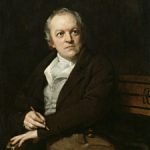
The Angel poetry
I Dreamt a Dream! what can it mean?
And that I was a maiden Queen:
Guarded by an Angel mild;
Witless woe, was neer beguil’d!
And I wept both night and day
And he wip’d my tears away
And I wept both day and night
And hid from him my hearts delight
So he took his wings and fled:
Then the morn blush’d rosy red:
I dried my tears & armd my fears,
With ten thousand shields and spears.
Soon my Angel came again;
I was arm’d, he came in vain:
For the time of youth was fled
And grey hairs were on my head
William Blake (1757 – 1827)
Poem: The Angel poem
fleursdumal.nl magazine
More in: Archive A-B, Blake, William
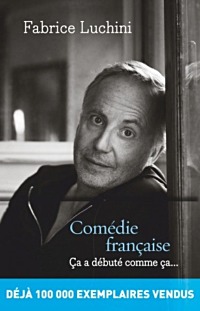 Il nous a fait redécouvrir La Fontaine, Rimbaud et Céline.
Il nous a fait redécouvrir La Fontaine, Rimbaud et Céline.
Il incarne l’esprit et le panache de la langue française. En prose, en vers et même en verlan, il a donné sa voix à d’immenses auteurs, auxquels il sait faire respirer l’air de notre temps – en racontant la fureur du Misanthrope à l’ère du téléphone portable, ou la sensualité de “La Laitière et le pot au lait” sur l’air d’une publicité pour Dim.
Il a quitté l’école à quatorze ans pour devenir apprenti coiffeur. Il est aujourd’hui l’un de nos plus grands comédiens, célébré pour ses lectures-spectacles, couronné par la Mostra de Venise pour son rôle dans son dernier film, L’Hermine.
Dans son autobiographie, Fabrice Luchini livre le récit d’une vie placée sous le signe de la littérature, à la recherche de la note parfaite.
Fabrice Luchini est né à Paris en 1951. Lancé par Philippe Labro et Éric Rohmer alors qu’il est encore apprenti coiffeur, révélé par le film La Discrète, en 1990, il est l’un des plus grands acteurs français. Il donne depuis plus de vingt ans des spectacles, désormais entrés dans la légende, consacrés aux auteurs qu’il aime. Il a été sacré meilleur acteur à la Mostra de Venise pour son rôle dans L’Hermine de Christian Vincent. Comédie française est son premier livre.
Fabrice Luchini
Comédie française
Ça a débuté comme ça
Paru le 02/03/2016
Genre: Essais littéraires
256 pages
135 x 210 mm
Broché
ISBN-10: 2081379171
ISBN-13: 978-2081379176
€19,00
Ed. Flammarion
new books
fleursdumal.nl magazine
More in: - Book Stories, Archive K-L, Art & Literature News, La Fontaine, Jean de, Louis-Ferdinand Céline, Rimbaud, Arthur, THEATRE

Komm
Du hast meinem Munde die reife Granatfrucht geschenkt,
Des Apfels starken Saft, erzeugende Kerne,
Hast in die Himmelsgründe kristallen wachsender Sterne
Wurzeln des Rebstocks versenkt.
Blau schwellen Trauben: koste.
Siehe, ich bin ein Garten, den du gen Abend erreicht,
Fiebrige Arme an schlanker silberner Pforte zu kühlen,
Im verstummten Geäst Aprikose zu fühlen,
Bin unterm südlichen Hauch, der die Ruhende streicht,
Eine schmale, blasse Wiese.
Erschauerndes Gräsergefilde, lieg ich bereit und bloß;
Mitternachtsglut schloß mir Lippen bebender Winde zu,
Doch die verborgenste Blüte öffnet den purpurnen Schoß:
Du.
Du … komm…
Spüre, ich bin die Frau; meine klugen Finger erfüllen
Milchiges Porzellan mit Gewürzen der Lust,
Gießen zaubrisches Naß. Du spreitest aus Hüllen
Schlagenden Fittich, taumelst an meine Brust,
Sinkst, ein großes, lastendes Glück, in Tiefen.
Sanfter nun trägt dich die Flut, streichelt lässig die Flanken
Wuchtendem Schiffe, das drüben im Hafen war
Mit ragenden Schornsteintürmen, Masten hoher Gedanken;
Fühlst du die Möwe wehn dir durch rauchig wirbelndes
Haar?
Gertrud Kolmar
(1894-1943)
gedicht: Komm
fleursdumal.nl magazine
More in: Archive K-L, Archive K-L, Kolmar, Gertrud

That out of sight is
out of mind
That out of sight is out of mind
Is true of most we leave behind;
It is not, sure, nor can be true,
My own and dearest love, of you.
They were my friends, ’twas sad to part;
Almost a tear began to start;
But yet as things run on they find
That out of sight is out of mind.
For men that will not idlers be
Must lend their hearts to things they see;
And friends who leave them far behind,
Being out of sight are out of mind.
I do not blame; I think that when
The cold and silent see again,
Kind hearts will yet as erst be kind,
‘Twas out of sight was out of mind.
I knew it, when we parted, well,
I knew it, but was loth to tell;
I knew before, what now I find,
That out of sight was out of mind.
That friends, however friends they were,
Still deal with things as things occur,
And that, excepting for the blind,
What’s out of sight is out of mind.
But love is, as they tell us, blind;
So out of sight and out of mind
Need not, nor will, I think, be true,
My own and dearest love, of you.
Arthur Hugh Clough
(1819-1861)
That out of sight is out of mind
fleursdumal.nl magazine
More in: Archive C-D, Archive C-D, CLASSIC POETRY
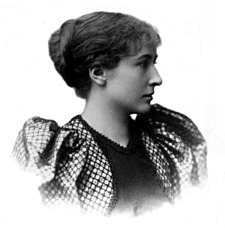
Night In State Street
Art thou he?—
The seer and sage, the hero and lover—yea,
The man of men, then away from the haughty day
Come with me!
Ho—ho! to the night—
The spangled night that would the noon outstare.
Her skirts are fringed with light,
She is girdled and crowned with gems of fire that flare.
The city is dizzy with the thrill of her—
Her shining eyes and shadowy floating hair;
And curious winds her nebulous garments blur,
Blowing her moon-white limbs and bosom bare.
She beckons me—
Down the deep street she goes to keep her tryst.
Come—come—oh follow! oh see
The many-windowed walls uprear so high
They dim and quiver and float away in mist
Tangling the earth and sky.
And the pale stars go by
Like spirits masterful and still and strong,
Dragging the heavy nets of life along.
Down in the deep
Lightly the nets enmesh us with the swarm
Of huddled human things that, soft and warm,
Beat out so close the pulses of their lives.
We crowd and creep,
We jostle and push out of our halls and hives,
We chatter and laugh and weep.
Ah, do you hear
The choral of voices, each the secret hiding?
Do you see the warren of souls, each one abiding
In separate solitude, remote, austere?
Here in the glare of the street we cling together
Against the warning darkness, the still height Of the awful night.
We blow like a feather
From hope to hope along the winds of fate
Importunate.
The lettered lights that twinkle in and out
Lure us and laugh at us, beckon and flout,
Flashing their slangy symbols in our eyes,
Blurting their gaudy lies.
The bold shop-windows flaunt their empty wares—
Jewelled or tinselled shows of things,
The fripperies and furnishings
Wherein stark life will stifle her shiverings
Ere forth in the dawn she fares.
Ah, tyranny perilous!
Vain shows that master us!
See the gay girls fluttering wistfully,
Where waxen dummies grin in gowns of lace.
Watch yonder woman in black, whose dimmed eyes see
Soft baby things folded with tender grace.
And look at the children crowding and shouting there
Where dancing dolls jiggle and jerk and stare.
They hover and cling
Possessed by signs and shadows of the thing.
They moor their bark
Close to the shore and fathom not the dark—
The dark that glooms afar
Beyond the invisible star,
Beyond faith’s boundaries,
The plausible was and is.
Come, ye adventurous,
Open your hearts to us!
You tiny newsboy, calling extras there,
Pitiful burden-bearer, pale with blight,
What of the night?—
The sullen night that brings you, little one,
So heavy a load of care,
While happier children sleep from sun to sun?
And you, wan youth, haggard and spent,
By mad thirst driven and rent—
Thirst of the body, thirst of the soul—
To what dark goal
Does reeling night lead you, her listless prey,
To gorge you and slay,
And hide forever from the searching day?
And you, furtive and flaunting girl,
Whose heavy-lidded eyes unfurl
Red signal fires, the while, demure,
Your brooding lips deny their lure—
Ah, does the lewd night lash you to her cave,
And will you never her ribald rage out-brave,
And rise no more forlorn
To greet the morn?
The street grows insolent.
With cries of dark delight
And gestures impudent
It rends the robe of night.
Up to the silent sky
It shouts the human cry.
The crowds push in and out
By all the open ways,
Eager to stare and shout
At vaudeville waifs of plays.
They drop their coins and laugh
At the wheezy phonograph,
They hush for the noisy drone
Of the croaking megaphone.
That litters life with jest
They pause that they may not go
On life’s eternal quest.
They stifle truth with speech,
They mimic love with lust,
For the glitter of gilt they reach
And cover the gold with dust.
They stoop to the din and glare
Who have the lofty night for comrade rare.
They grope along the ground
Whose stature like the night with stars is crowned.
Oh piteous!
Oh struggle vain!
Of puppets emulous,
We strive and strain
To forge for our limbs a chain.
Come, thou deep-hearted Night, so dark and bright !
Come, holy Night, come, lawless, dissolute Night!
Come, human Night, hushing thy dreams divine!
Give me thy dreams, O Night—they shall be mine!—
Mine and this beggar’s, though we lie to thee!
Mine and this harlot’s, though from thee we
flee! Mine and this worldling’s, though with might and right
We hide them from our sight.
Thy shadowed eyes the truth behold, and we—
We too shall know the truth, and so be free!
Even now—yea, now
Through lies and vanities we pry and peer.
Even now we bow
At little shrines where pale fires flicker and fleer.
Hark! in the echoing street
The drums that bang and beat,
Where the curb-stone preachers tell
The way to heaven and hell.
Look! in yon window there
A man through a glass astare
At atoms and embryos,
The source whence all life flows.
Search the beginning and end.
We may not choose but follow—
Yes, you and I and these—
The fume of the noisome hollow,
The gleam of the Pleiades.
Wherever one goes in quest
With his quest we are cursed or blest.
And the street, with its blazing mockery of
noon, Leads on to the quiet stars, to the lofty moon.
The little lights go out now row on row,
The dim crowds glide away.
The shadowed street
Pillars the vaulted sky.
And Night, proud Night,
Rapt in her dreams, with stately tread and slow
Patrols the drowsy world. O friend complete,
How may we read her deep delight aright?
Art thou he—
The seer and sage, the hero and lover—yea,
The man of men, then even to the gates of day
Lead thou me!
Harriet Monroe
(1860 – 1936)
Night In State Street
fleursdumal.nl magazine
More in: Archive M-N, LITERARY MAGAZINES, Monroe, Harriet
 “Il fallait bien qu’un jour je croise la route de Lady Chatterley. J’ai fait mieux, je suis tombée amoureuse de celui qui l’imagina, D. H. Lawrence, à cause de sa figure de mauvais coucheur, à cause de l’extraordinaire sensibilité de son “écriture androgyne” dont parlait Anaïs Nin.
“Il fallait bien qu’un jour je croise la route de Lady Chatterley. J’ai fait mieux, je suis tombée amoureuse de celui qui l’imagina, D. H. Lawrence, à cause de sa figure de mauvais coucheur, à cause de l’extraordinaire sensibilité de son “écriture androgyne” dont parlait Anaïs Nin.
Pendant deux ans, je n’ai pas quitté cet amateur des grands espaces qui, lorsqu’il écrivait, ne s’est jamais encombré des barrières du surmoi. J’ai voulu faire redécouvrir cet auteur célèbre qui n’est plus assez lu, contemporain des suffragettes, et qui vécut entouré de femmes libres. Il avait compris qu’au vortex de leur émancipation et de leurs revendications se trouvait le plein accomplissement de leur jouissance sexuelle.” Catherine Millet.
Catherine Millet
Aimer Lawrence
Paru le 20/09/2017
Genre: Essais littéraires
304 pages
138 x 210 mm
Broché
ISBN-10: 2081372614
ISBN-13: 978-2081372610
€21,00
Editeur : Flammarion
Langue : Français
new books
fleursdumal.nl magazine
More in: - Book Stories, Archive K-L, Archive M-N, D.H. Lawrence, Erotic literature, Lawrence, D.H.
Thank you for reading Fleurs du Mal - magazine for art & literature